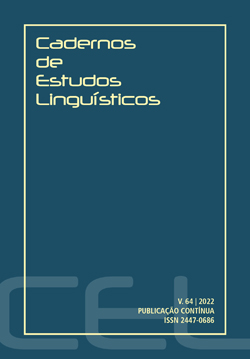Abstract
At a time of deepening neoliberalism, with its overriding commitment to the speed of production, the scientific research paper has become one of the most prevalent forms of communication in the academic-scientific field. It is one of the factors used to compose institutional rankings and is itself a recurring theme in studies related to literacy, the teaching of writing, and discourse studies. Swales (1990) offers some proposals that draw on knowledge from different theoretical fields to contribute to the teaching of academic writing. In this area, the main objective of this study is to understand how the rhetorical moves in the introductions and conclusions of scientific papers in the area of education are expressed in the composition, style and thematic development of this genre. The study corpus is composed of 16 papers from the field of education published in journals classified as A1 in the Brazilian Qualis system for the four years from 2013 to 2016. The results reveal the presence of the rhetorical moves identified by Swales, through the discursive strategies of stance and engagement (HYLAND, 2015), and contribute to the compositionality of the genre. Despite this, it is not possible to state, as described by Swales, that such moves are mandatory. It was also found that the configurations of systematic language choices must be understood within a disciplinary field and that the text reflects the choices and limitations acting on the authors.
References
ARANHA, S. A Busca de modelos retóricos mais apropriados para o ensino de escrita acadêmica. Revista do GEL, S. J. do Rio Preto, v. 4, n. 2. 2007, p. 97-114.
ASSIS, J. A. Representações sobre os textos acadêmico-científicos: pistas para a didática da escrita na universidade. Estudos Linguísticos, v.43, n.2. 2014.
ASSIS, J. A. Representações sociais sobre o professor na formação inicial docente: diálogos e confrontos In: REICHMANN, Carla; GUEDES, Ana Lúcia (Org.). Horizontes im/possíveis no estágio: práticas de letramento e formação de professores de línguas. São Paulo: Pontes Editores. 2018, p. 67-84.
BAKHTIN, M. Estética da criação verbal. São Paulo: Martins Fontes, 2003
BARTON, D.; HAMILTON, M. Local literacies London and NY: Routledge, 1998.
BAZERMAN, C. Gêneros, agência e escrita. São Paulo: Cortez, 2006.
BRASIL. Ministério da Educação. Reforma da educação superior. Reafirmando princípios e consolidando diretrizes da reforma da educação superior. Documento II. 2004. 14p. Disponível em: <http://www.mec.gov.br/htm>. Acesso em: 21 ago. 2020.
BRASILEIRO, A. M. M. Didática da escrita acadêmica: práticas docentes efetivas na perspectiva de alunos de graduação (Academic writing teaching: effective teaching practices from the perspective of undergraduate students). Estudos da Língua(gem), [S. l.], v. 18, n. 2, p. 55-77, 2020. DOI: 10.22481/el.v18i2.6995. Disponível em: https://periodicos2.uesb.br/index.php/estudosdalinguagem/article/view/6995. Acesso em: 19 jul. 2022.
BRASILEIRO, A. M. M. Como produzir textos acadêmicos e científicos. São Paulo: Contexto, 2021.
CAPES. Ficha de avaliação dos programas de pós-graduação. Brasília, 2019. Disponível em: https://www.capes.gov.br/images/novo_portal/documentos/DAV/avaliacao/10062019_FichaAvalia%C3%A7%C3%A3o.pdf. Acesso em: 07 mai. 2020.
CAPES. Sistema Nacional de Pós-Graduação Brasileira: atualidades e perspectivas. Brasília, agosto de 2019. Disponível em: https://www2.camara.leg.br/atividade-legislativa/comissoes/comissoes-temporarias/externas/56a-legislatura/ministerio-da-educacao-e-planejamento-estrategico/documentos/audiencias-publicas/SoniaNairBao.pdf. Acesso em: 07 mai. 2020.
CORRÊA, M. L. G. As perspectivas etnográfica e discursiva no ensino da escrita: o exemplo de textos de pré-universitários. Revista da ABRALIN, v. Especial, p. 333-356, 2011.
DELCAMBRE, I.; LAHANIER-REUTER, D. Discurso de outrem e letramentos universitários. In: RINCK, F.; BOCH, F.; ASSIS, J. A. (Org.). Letramento e formação universitária: formar para a escrita e pela escrita. Campinas, SP: Mercado de Letras, 2015. p. 225-250.
HYLAND, K. Disciplinary discourse: social interactions in academic writing. Singapura: Pearson Education Limited, 2000.
HYLAND, K. Metadiscourse: exploring interaction in writing. Continuum: Londres, 2005.
HYLAND, K. Writing in the disciplines: research evidence for specificity. Taiwan international esp journal, v.1, 2009, p.5-22.
HYLAND, K. Genre, Discipline and identity. Journal of english for academic purposes. Vol 19. 2015, p. 32-43.
HYLAND, K.; TSE, P. Metadiscourse in academic writing: A reappraisal. Applied linguistics, 25. 2004, p. 156-177.
LEA, M. R.; STREET, B.V. Student writing in higher education: an academic literacies approach. Studies in Higher Education. 1998. v. 23, n. 6, p. 157– 172.
LEA, M. R. O Modelo de “Letramentos Acadêmicos”: Teoria e Aplicações. Revista Filologia. Linguíst., nº 2, v. 16, p. 477-493, jul./dez. 2014.
MARCUSCHI, Luiz Antônio. Produção textual, análise de gêneros e compreensão. São Paulo: Parábola Editorial, 2008.
MILLER, C. Estudos sobre gênero textual, agência e tecnologia. In: DIONÍSIO, A. P.; HOFFNAGEL, J. C. (Org.). Estudos sobre gênero textual, agência e tecnologia. Carolyn R. Miller. Recife: Universitária da UFPE, 2009.
MOTTA-ROTH, Désirée; HENDGES, Graciela H. Produção textual na universidade. São Paulo: Parábola Editorial, 2010.
REUTER, Yves. Analyser les problèmes de l’éscriture de recherche en formation. Pratiques, n. 121-122, p. 9-27, 2004.
SOBRAL, Adail. Do dialogismo ao gênero: as bases do pensamento do Círculo de Bakhtin. Campinas, São Paulo: Mercado de Letras, 2009.
SWALES, J. M. Research genres: explorations and applications. Cambridge, England: Cambridge University Press, 2004.
SWALES, J. M. Other floors other voices. Mahwah, NJ: Earlbaum.1998.
SWALES, J. M. Genre analysis: english in academic and research settings. Cambridge (UK); New York: Cambridge University Press, 1990.
SWALES; J.; FEAK, C. Academic writing for graduate students: a course for nonnative speakers of english: essential tasks and skills. Univ of Michigan, 1994.
VOLOCHINOV, V. N. Marxismo e filosofia da linguagem. São Paulo: HUCITEC, 2010.

This work is licensed under a Creative Commons Attribution-NonCommercial 4.0 International License.
Copyright (c) 2022 Cadernos de Estudos Linguísticos


